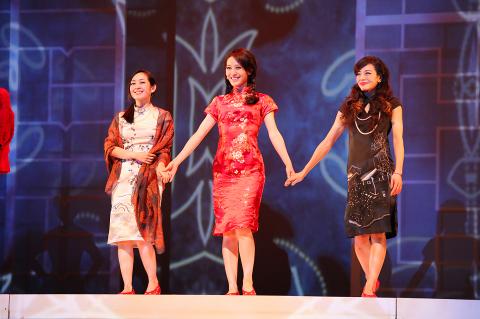One of the flagship productions of the 2013 Kaohsiung Spring Arts Festival (高雄春天藝術節), Forever Dialogue (愛。時尚), premiered in Kaohsiung last week, and will now tour Taiwan. The show, which mixes an exuberant celebration of consumer culture and an intimate portrait of three Chinese women, has brought together a number of big names that guarantee appeal across the Strait.
Forever Dialogue stars Vega Tsai (蔡燦得), a popular presence on Taiwan’s stage and screen; Hong Kong’s Perry Chiu (焦媛), a veteran stage actress; and Chinese screen actress Cheryl Hsieh (謝承穎). At the center of the story is a pair of embroidered silk slippers, which link up a deconstructed tale that starts in 1940s Shanghai and extends to the modern day, following its main characters from the Republican era through to contemporary China, a period in which both the appearance of Chinese women, and the social milieu in which they exist, has changed out of all recognition.
Directed by Li Zongxi (李宗熹), who picked up the Kaohsiung Culture and Arts Award (高雄文藝獎) in 2012 and is a bright new star on the Chinese-language theater scene, Forever Dialogue is a big-budget production showcasing not just its three leading ladies, but also the talents of a top-notch behind-the-scenes team. Given that the show not only focuses on the emotions of three women, but also their material accoutrements, it is fitting that another star of the show is fashion designer Goji Lin (林國基).

Photo courtesy of Taiwan Drama Performance
“It is much more than just a piece of theater,” Lin said. “It is also more than a fashion show. I have designed over 10 sets of costumes specifically for this production, which are presented in a number of catwalk displays. There are fashion shows within the play, and the emotions of the play pervade the fashion show. It’s really an amazing experience, and the first time I have done anything like this in all my years as a designer. The performance, the language and the emotions in the play make the fashion items even more expressive.”
Set design is by Max Li (黎仕祺), who regularly manages the design for mega concerts by stars such as Judy Chiang (江蕙) and Jeff Chang (張信哲), and music is by the multi-award winning Cello Fan (范宗沛), who composed and won a Golden Melody Award for the Original Soundtrack of the hit TV series The Crystal Boys (孽子).
The fact that this show about women, which is supposedly targeted at women, has an almost exclusively male production team might give rise to snide suggestions that not much has really changed in the position of women in Chinese society, but the appeal of the three female stars and the general bling of the production is likely to drown out negative commentary.
By all accounts, the premiere last week in Kaohsiung was a great success, and will now be followed by this weekend’s show in Hsinchu, followed by Tainan, Taipei and Taichung. The show will then tour the region with bookings in Shanghai, Hong Kong, Singapore and Beijing. More information regarding the show and performance schedule can be found at www.performer.org.tw.

That US assistance was a model for Taiwan’s spectacular development success was early recognized by policymakers and analysts. In a report to the US Congress for the fiscal year 1962, former President John F. Kennedy noted Taiwan’s “rapid economic growth,” was “producing a substantial net gain in living.” Kennedy had a stake in Taiwan’s achievements and the US’ official development assistance (ODA) in general: In September 1961, his entreaty to make the 1960s a “decade of development,” and an accompanying proposal for dedicated legislation to this end, had been formalized by congressional passage of the Foreign Assistance Act. Two

March 31 to April 6 On May 13, 1950, National Taiwan University Hospital otolaryngologist Su You-peng (蘇友鵬) was summoned to the director’s office. He thought someone had complained about him practicing the violin at night, but when he entered the room, he knew something was terribly wrong. He saw several burly men who appeared to be government secret agents, and three other resident doctors: internist Hsu Chiang (許強), dermatologist Hu Pao-chen (胡寶珍) and ophthalmologist Hu Hsin-lin (胡鑫麟). They were handcuffed, herded onto two jeeps and taken to the Secrecy Bureau (保密局) for questioning. Su was still in his doctor’s robes at

Last week the Democratic Progressive Party (DPP) said that the budget cuts voted for by the China-aligned parties in the legislature, are intended to force the DPP to hike electricity rates. The public would then blame it for the rate hike. It’s fairly clear that the first part of that is correct. Slashing the budget of state-run Taiwan Power Co (Taipower, 台電) is a move intended to cause discontent with the DPP when electricity rates go up. Taipower’s debt, NT$422.9 billion (US$12.78 billion), is one of the numerous permanent crises created by the nation’s construction-industrial state and the developmentalist mentality it

Experts say that the devastating earthquake in Myanmar on Friday was likely the strongest to hit the country in decades, with disaster modeling suggesting thousands could be dead. Automatic assessments from the US Geological Survey (USGS) said the shallow 7.7-magnitude quake northwest of the central Myanmar city of Sagaing triggered a red alert for shaking-related fatalities and economic losses. “High casualties and extensive damage are probable and the disaster is likely widespread,” it said, locating the epicentre near the central Myanmar city of Mandalay, home to more than a million people. Myanmar’s ruling junta said on Saturday morning that the number killed had